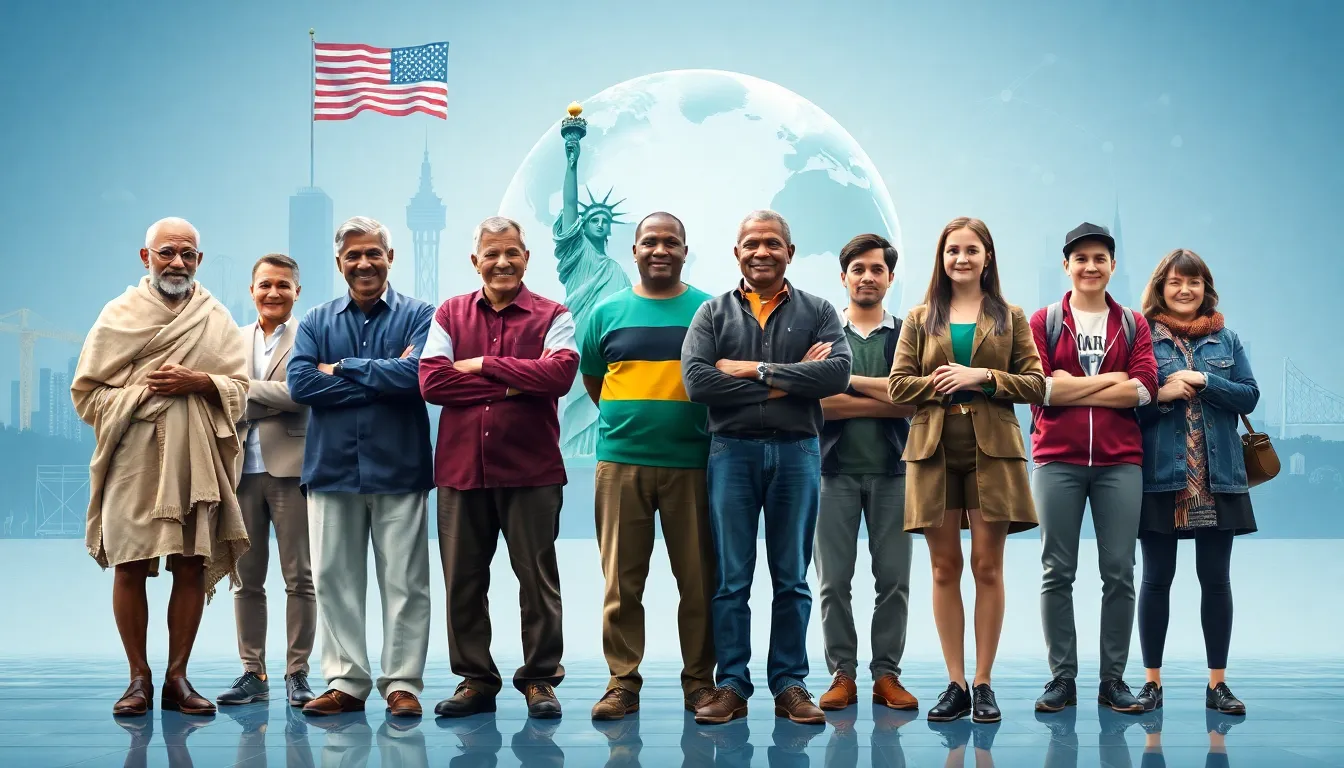Table of Contents
ToggleIn today’s interconnected world, global influence shapes societies, economies, and cultures like never before. From the rise of social media to international trade agreements, the impact of global interactions is profound and far-reaching. Countries and individuals alike are navigating this complex landscape, where ideas and trends can spread across borders in the blink of an eye.
Understanding global influence is crucial for anyone looking to thrive in a rapidly changing environment. It affects everything from business strategies to personal relationships, highlighting the importance of cultural awareness and adaptability. As the world continues to shrink, recognizing the forces at play can empower individuals and organizations to harness opportunities and mitigate challenges on a global scale.
Definition Of Global Influence
Global influence refers to the capacity of an entity—whether a nation, organization, or individual—to affect thoughts, behaviors, and actions across borders. This influence manifests through various channels, including media, technology, trade, and diplomacy.
Entities with global influence shape cultural trends, economic policies, and social norms internationally. For instance, social media platforms like Facebook and TikTok transcend geographic boundaries, rapidly disseminating information and trends. Similarly, multinational corporations impact local economies by altering consumer preferences and employment opportunities.
Global influence signifies not only the ability to spread ideas but also the responsibility that accompanies such power. Entities must navigate cultural sensitivities and ethical considerations to maintain credibility and foster positive relationships worldwide. Understanding global influence enables effective engagement with diverse audiences and enhances strategic decision-making in various sectors.
The significance of global influence continues to expand as technological advancements bridge gaps between people and cultures. Embracing this concept allows individuals and organizations to leverage opportunities while addressing the complexities of a connected world.
Historical Context

Understanding the historical context of global influence reveals the evolution of interactions among nations, cultures, and economies. Key events and notable figures played crucial roles in shaping the current landscape of global influence.
Key Events Shaping Global Influence
- The Age of Exploration (15th-17th Century): European exploration led to the establishment of trade routes and cultural exchanges between continents. This period initiated globalization as populations encountered new goods, ideas, and cultures.
- The Industrial Revolution (18th-19th Century): Advances in technology fueled economic growth and expanded international trade. The revolution shifted populations towards urbanization and increased demand for resources across borders.
- World Wars (20th Century): The two World Wars reshaped political boundaries and alliances. Post-war restructuring led to the formation of international organizations, such as the United Nations, fostering cooperation and promoting global stability.
- The Cold War Era (1947-1991): Ideological competition between the US and the Soviet Union influenced global politics. Proxy wars, espionage, and alliances affected trade and cultural exchanges in numerous regions.
- The Rise of the Internet (1990s-Present): The digital revolution transformed communications and commerce. Social media platforms and e-commerce expanded the ability to share information and engage with global audiences instantly.
Notable Figures in Global Influence
- Mahatma Gandhi: His philosophy of nonviolent resistance inspired global movements for civil rights and freedom. Gandhi’s approach has influenced activists worldwide in their struggles against oppression.
- Nelson Mandela: As a leader in the fight against apartheid in South Africa, Mandela became a symbol of resistance against injustice. His efforts towards reconciliation and peace have inspired global leaders and movements.
- Malala Yousafzai: An advocate for girls’ education and human rights, Yousafzai’s activism highlights the importance of education in empowering communities around the world. Her message has resonated across borders, influencing policies related to education.
- Elon Musk: Musk’s innovations in technology, including electric vehicles and space exploration, have a significant impact on global industries. His vision for sustainability and exploration has changed perceptions of environmental responsibility and technological advancement.
- Greta Thunberg: As a climate activist, Thunberg has mobilized millions towards global climate action. Her influence has sparked conversations on sustainability, emphasizing the urgency of addressing climate change.
The historical context is essential to grasping the complexities of global influence, illustrating how past events and key individuals shape today’s interactions and trends across various sectors.
Factors Contributing To Global Influence
Global influence stems from various interconnected factors that shape international relations and cultural landscapes. These include economic power, cultural exchange, and technological advancements.
Economic Power
Economic power significantly drives global influence. Nations with strong economies like the United States, China, and Germany can shape global markets and policies. Wealth allows these countries to invest in infrastructure, provide foreign aid, and project military strength. For example, the Trade War between the U.S. and China illustrates how economic sanctions and tariffs can influence not only bilateral relations but also global trade dynamics. Additionally, multinational corporations wield substantial economic influence, impacting local economies and international policies through investment decisions and corporate social responsibility initiatives.
Cultural Exchange
Cultural exchange plays a vital role in fostering global influence. This exchange occurs through media, arts, and education, promoting understanding and collaboration among diverse societies. Festivals, music, cinema, and culinary traditions transcend borders, shaping perceptions and attitudes. Significant platforms for cultural exchange include international film festivals and cultural heritage programs. The global popularity of K-pop illustrates how culture can cross borders, creating massive fanbases and influencing fashion and lifestyle trends worldwide. Cultural ambassadors, such as artists and authors, contribute to this dialogue, enriching global understanding and engagement.
Technological Advancements
Technological advancements are crucial in enhancing global influence. The rapid proliferation of the Internet and social media facilitates the instantaneous sharing of information and ideas. Platforms like Facebook, Twitter, and TikTok enable individuals and organizations to reach global audiences swiftly. Technologies such as artificial intelligence and blockchain redefine industries and challenge traditional practices, offering new avenues for influence. Furthermore, access to technology allows for remote collaboration, making it possible for innovators and activists to share knowledge and mobilize efforts across borders. The COVID-19 pandemic underscored the importance of technology in connecting people globally, demonstrating its role in shaping social norms and responses.
Current Trends In Global Influence
Current trends in global influence reflect rapid shifts in how societies interact and engage with one another. The emergence of social media and the formation of political alliances significantly enhance the ability of entities to communicate and collaborate across borders.
The Role of Social Media
Social media serves as a powerful tool for shaping global influence. Platforms like Facebook, Twitter, Instagram, and TikTok allow individuals and organizations to share ideas instantaneously. Social media influencers, with large followings, can sway public opinion on topics such as climate change and global justice. For instance, the hashtag #BlackLivesMatter gained worldwide traction, highlighting issues of racial inequality and driving movements for justice in various countries. Additionally, brands leverage social media trends to adapt their marketing strategies, appealing to diverse audiences and fostering a sense of community around shared values.
Global Political Alliances
Global political alliances play a crucial role in contemporary global influence. Organizations like the United Nations (UN), the North Atlantic Treaty Organization (NATO), and the European Union (EU) promote cooperative policies and diplomatic relations among member states. These alliances facilitate collaboration on pressing issues, including trade agreements, international security, and climate initiatives. For example, the Paris Agreement exemplifies a collective effort to combat climate change, demonstrating how countries unite under global pacts. The alignment of nations in these alliances amplifies their voices on the world stage, reinforcing shared objectives and mutual interests.
Global influence is a powerful force shaping the world today. As societies become increasingly interconnected the impact of cultural exchange and technological advancements cannot be overstated. Individuals and organizations must recognize their role within this dynamic landscape.
Navigating global influence requires cultural awareness and adaptability to seize opportunities and tackle challenges effectively. By understanding the historical context and current trends in global influence one can engage meaningfully with diverse audiences. Embracing this knowledge fosters collaboration and promotes responsible engagement in an ever-evolving world.







